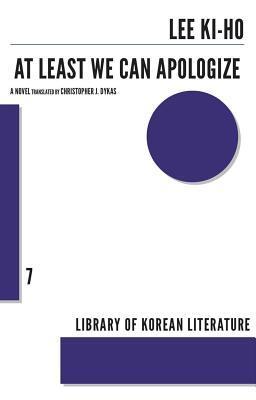What do you think?
Rate this book


185 pages, Paperback
First published January 1, 2009
This is what happens to Sibong and Jin-man, two young men who were brought to a mental institution at an early age, and then forced to adapt at such demanding place.
The story At Least We Can Apologize penned by Lee Ki-Ho begins in a light, somber tone. One could chuckle and smile a bit at the silliness of the premise. But one will also know that there is something foreboding about it.
Admittedly, I purchased the ebook after being intrigued by the book’s synopsis. I was like: ‘who, in their right minds, will apologize for any wrong of my own doing?’
Yet, unknowingly, with that question, I also found the answer. Who in their right minds will do such thing? Presumably, the antagonists in the story were not of right minds because they were admitted to a mental institution. But were they?
This is what the narrative explores. Through Jin-Man’s thoughts and voice, I began to empathize, relate and explore what really is being mentally-ill and what it is not. For there is a fine, thin line between that on some, maybe most, people.
I like the book because it does not dither and dawdle on what it truly can be in the world of mental health care (or lack thereof). I do not wish to reveal more of the plot but I can say that the story makes this known in such peculiar and gripping ways.
I also found the narrator’s voice curious, candid and sincere. Though warped and nonlinear may the narrator’s way of thinking is, the reader will come to understand and justify why this is so.
I find this story highly recommended if you prefer to read less-talked about topics or issues intertwined in the plot with an air of mystery. It is not an effort to read at all. This was one of my apprehensions at first but, gladly, it was all easily overshadowed with further reading.
Altogether, it’s an engaging read because the story can be real to any one person. We do not have to be mentally-ill to relate to it. Nor we do not have to be thoroughly sane to realize the foolhardy ways with which we live unapologetic lives.
To end this review, I leave with my favorite quote from the book:
Because sometimes your wrongs only go away if you pretend you never knew them.